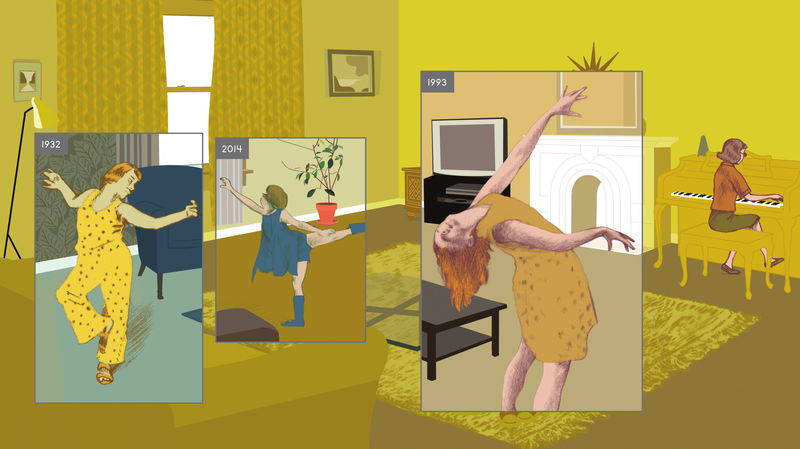I was first altered to Here by Richard McGuire in this review in the New York Times Book Review, and thank goodness for that because this is one of the best books I have read in a long time.
Before I get to my sound bite review it is important to note that Here, while a newer full page book [December 2014], is an older story with an important place in graphic novel history. From The Guardian:
In 1989, Richard McGuire, an aspiring New York artist, drew a 36-panel comic that leapt back and forth through thousands of years of history without ever stepping outside the four walls of a suburban living room – a feat he achieved by floating frames within frames (his inspiration was Microsoft Windows, then just four years old). The comic, called Here, was published in Raw, the edgy anthology edited by Art Spiegelman and Françoise Mouly, and caused a stir among younger cartoonists. Chris Ware, who would go on to create the award-winning Jimmy Corrigan: The Smartest Kid on Earth, said McGuire’s strip came closer to capturing “real memory and experience than anything that had come before”.You can go to the linked NYT review or The Guardian one above for more plot detail.
Becky's Soundbite Review [with a panel illustration]:
“A corner of one NJ living room is both the setting and the subject of this graphic novel, as McGuire tells the story of this single place from prehistoric times to thousands of years in the future [but not in chronological order]. The stories are literally and figuratively layered as McGuire places drawings, clearly labelled with their year, on top of one and other. While it may sound confusing, McGuire tells a coherent, cohesive, and compelling tale of a place and those that have and will live in it. The result is a fascinating and original story that forces the reader to contemplate his or her place in the universe. It is in equal turns beautiful and unsettling. It is a reading experience you will not forget for a long time; in fact, you may find yourself turning the last page only to go immediately back to page one."Clearly, this is a unique way to tell a story. McGuire relies on very few words, although the ones he does include, add much to the pictures. Words, phrases, and situations repeat over time, as do the pictures. It is as if history [and the future] are echoing throughout time in this one place.
I cannot stress enough how easy the story is to follow once you get in the rhythm. I had to read the first few pages a few times, going back and forth for ten minutes or so. But then, maybe the fourth time I started, I didn’t go backward for a while. I kept reading, occasionally paging back to see something again, and I didn’t stop until I finished it. And as I said in the soundbite above, after I turned the final page, I went right back to the beginning and started the entire book again.
On a personal note, I purchased a copy of this book, and I am glad I did because I have already read it twice and my ten year-old son has read it too. I have left the book out in a common area and he has gone back to it a few times, has shown it to others, and continues to discuss it with me. This truly is a book for the entire family. In fact, it is even better if you read it together in a corner of your own living room.
Still not convinced? Think it is a bit too unconventional for your patrons. Take a look at this great article in Wired, which outlines five reasons why you should read this book. It also has more panels to look at and talks about the amazing interactive e-book version.
This is an inventive and unique graphic novel that is truly accessible to any reader-- from graphic novel regulars to newbies. The setting is familiar. Everyone has a living room. Everyone has thought of the others who have lived in their home or on their land before. But Here forces you to confront your home, your place in it, what it was before you, and what it will be long after. you are gone. Talk about universal.
Notes on the Art: The color palate is muted. The pictures are easy to understand. While McGuire labels the top left of each panel, no matter where that panel resides on the page, the drawing styles and colors that tell the story for each year are unique to that year. So as you are reading, despite the fact that the time frame jumps around, you get to know the drawing style of the “era” and you can start placing yourself within the story even before you see the year marked in the top left corner of the box.
Three Words That Describe This Book: thought-provoking, layered, original
Readalikes: As the quote from The Guardian above notes, McGuire greatly influenced Chris Ware. I did not know this while I was reading Here, but I did make the connection between why I was enjoying Here and why I loved Building Stories. Anything by Ware is a great readalike, but in particular, Building Stories with its inventive story telling style and its focus on a single place to center the larger story, shares much with Here. The illustrations and color palate are also similar.
Another graphic novelist who tells thought provoking stories with inventive and original storytelling techniques is Adrian Tomine. Try Killing and Dying, also from this year and on many best lists.
Back in 2009 I read Asterios Polyp by David Mazzucchelli. While that graphic novel is much more character driven than this one, the thought-provoking storylines of both force the reader to think broadly about life and our place in the world.


No comments:
Post a Comment